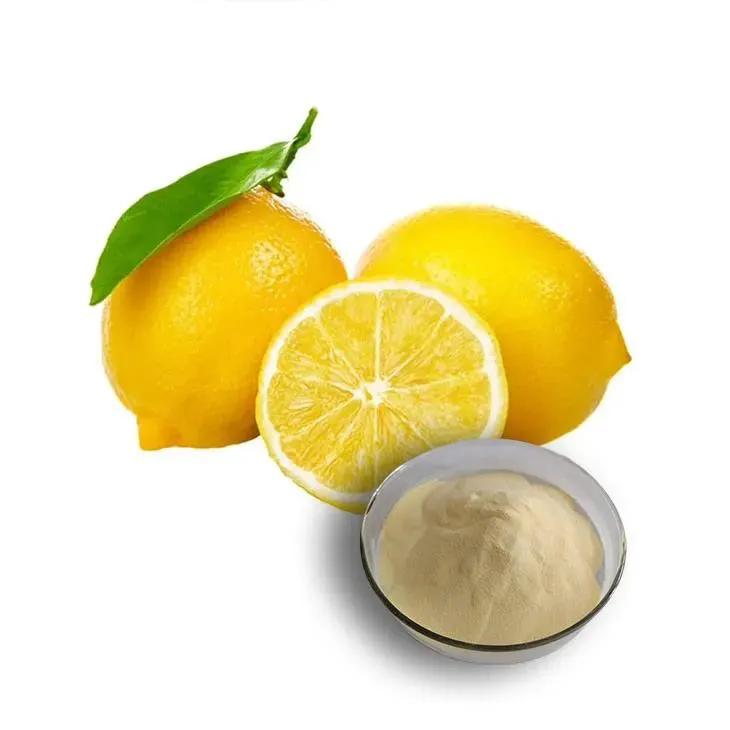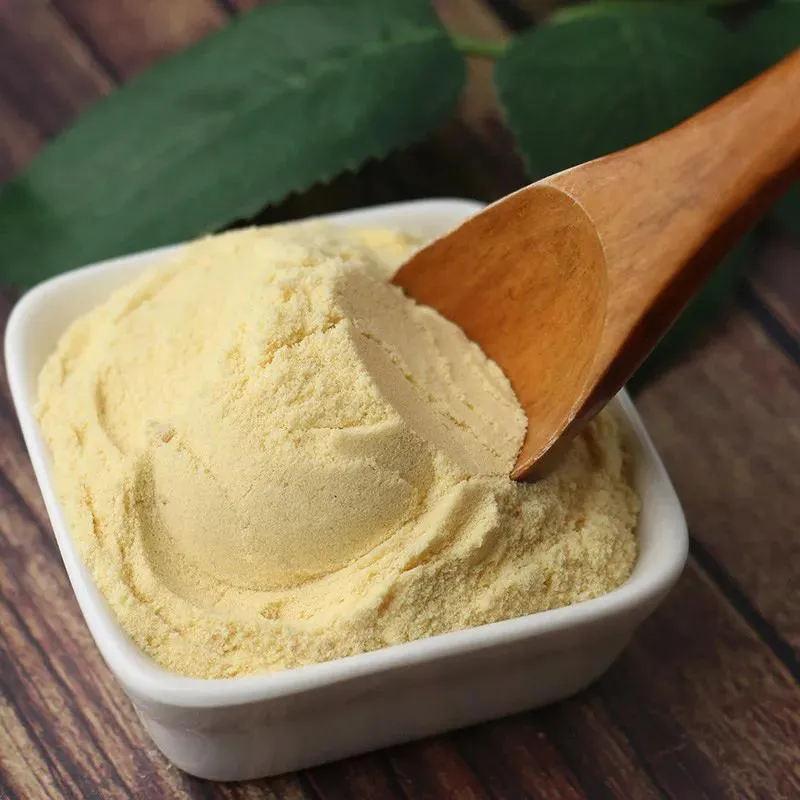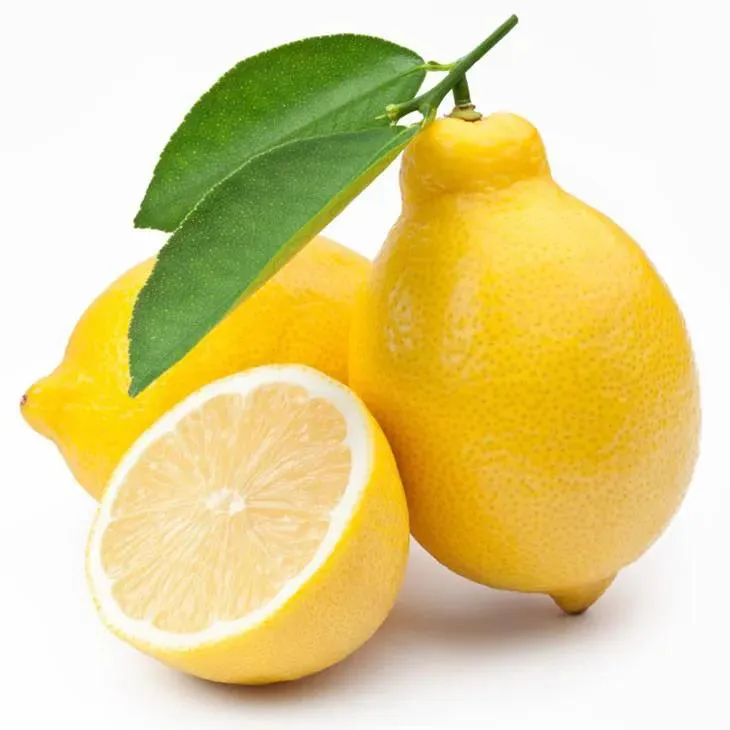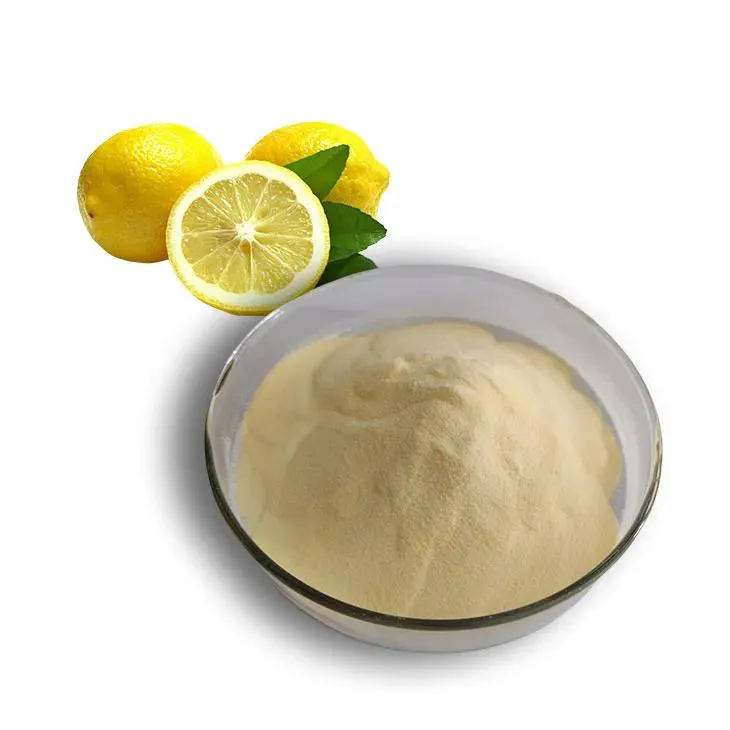- 0086-571-85302990
- sales@greenskybio.com
What is lemon juice powder and why is it used on the skin?
2024-11-14

1. Introduction to Lemon Juice Powder
Lemon Juice Powder is a concentrated form of lemon juice. It is created through a drying process that removes the water content from the fresh lemon juice while retaining many of its beneficial components. This powder has become popular in various applications, especially in the field of skin care.

2. The Production Process of Lemon Juice Powder
2.1 Harvesting and Selection of Lemons
The first step in creating lemon juice powder is to carefully harvest and select fresh lemons. Only high - quality lemons are chosen, as they will determine the quality of the final product. Lemons should be ripe but not overripe, as overripe lemons may have started to decompose and could introduce unwanted substances into the juice.2.2 Extraction of Lemon Juice
Once the lemons are selected, the juice is extracted. This can be done through mechanical pressing methods. The extracted juice contains not only the water but also various substances such as citric acid, vitamins, and flavonoids.2.3 Drying Process
After extraction, the lemon juice goes through a drying process. There are different drying methods, such as spray drying or freeze - drying. Spray drying involves spraying the lemon juice into a hot chamber where the water evaporates quickly, leaving behind the powdered form. Freeze - drying is a more gentle process where the lemon juice is frozen first and then the water is removed through sublimation under low pressure. This process helps to preserve more of the delicate nutrients in the lemon juice.
3. Nutritional Components in Lemon Juice Powder
3.1 Citric Acid
One of the main components in lemon juice powder is citric acid. Citric acid has several properties that are beneficial for the skin. It has a natural acidity that can help to balance the skin's pH level. When the skin's pH is balanced, it is less likely to be prone to various skin problems such as acne and infections.3.2 Vitamins
Lemon juice powder contains vitamins such as vitamin C. Vitamin C is a powerful antioxidant that can protect the skin from free radical damage. Free radicals are unstable molecules that can damage skin cells, leading to premature aging, wrinkles, and dull skin. Vitamin C also plays a role in collagen synthesis. Collagen is a protein that gives the skin its elasticity and firmness. By promoting collagen synthesis, vitamin C can help to keep the skin looking youthful and supple.3.3 Flavonoids
Flavonoids are another important group of nutrients in lemon juice powder. These are plant - based compounds that have antioxidant, anti - inflammatory, and anti - microbial properties. In terms of skin health, flavonoids can help to reduce inflammation, which is often associated with skin conditions like eczema and psoriasis. They can also fight against bacteria and fungi that may infect the skin.
4. Reasons for Using Lemon Juice Powder on the Skin
4.1 Astringent Properties
Lemon juice powder has astringent qualities. This means that when it is applied to the skin, it can cause the skin tissues to contract, which in turn tightens the pores. Tight pores give the skin a smoother appearance and can also help to prevent dirt and debris from easily entering the pores. This can be especially beneficial for people with oily skin, as larger pores are often a characteristic of oily skin types.4.2 Skin Rejuvenation
The nutrients present in lemon juice powder, such as flavonoids and vitamin C, contribute to skin rejuvenation. As mentioned earlier, vitamin C promotes collagen synthesis, which is essential for maintaining the skin's firmness and elasticity. Flavonoids, with their anti - inflammatory and antioxidant properties, can help to repair damaged skin cells and promote the growth of new, healthy cells. This can lead to a reduction in the appearance of fine lines, wrinkles, and age spots, giving the skin a more youthful and radiant look.4.3 Natural Toner
Lemon juice powder can act as a natural toner. It helps to regulate the skin's oil production. For those with oily skin, it can reduce the excess oiliness, leaving the skin feeling clean and refreshed. It also helps to remove any remaining dirt or makeup residue on the skin after cleansing. Additionally, as a toner, it can prepare the skin for better absorption of other skin care products such as moisturizers.4.4 Lightening and Brightening
The citric acid and vitamin C in lemon juice powder can have a lightening effect on the skin. They can help to fade dark spots, hyperpigmentation, and acne scars. This is because they can inhibit the production of melanin, the pigment responsible for skin color. By reducing melanin production in areas of hyperpigmentation, the skin can become more evenly toned and appear brighter.
5. How to Use Lemon Juice Powder on the Skin
5.1 Face Masks
One popular way to use lemon juice powder on the skin is to make a face mask. You can mix the lemon juice powder with other natural ingredients such as honey, yogurt, or aloe vera gel. For example, a simple face mask can be made by mixing 1 teaspoon of lemon juice powder with 1 tablespoon of honey. Honey has moisturizing properties, and when combined with the astringent and rejuvenating effects of lemon juice powder, it can create a great face mask for all skin types. Apply the mixture to the face and leave it on for 10 - 15 minutes before rinsing off with warm water.5.2 Toners
To make a natural toner using lemon juice powder, dissolve a small amount (about 1/2 teaspoon) in 100ml of distilled water. You can then transfer the solution to a spray bottle. After cleansing your face, spray the toner onto your face and let it dry naturally or pat it dry with a clean towel. This toner can be used daily to balance the skin's pH, reduce oiliness, and refresh the skin.5.3 Spot Treatments
For treating specific skin problems such as acne or dark spots, lemon juice powder can be used as a spot treatment. Make a paste by mixing a small amount of lemon juice powder with a few drops of water. Apply the paste directly to the affected area and leave it on for a few minutes. However, it is important to note that lemon juice can be quite acidic, so it may cause some irritation on sensitive skin. If any discomfort is felt, rinse the area immediately.6. Precautions When Using Lemon Juice Powder on the Skin
6.1 Skin Sensitivity
Lemon juice powder is acidic, and as such, it may cause irritation or allergic reactions in some people, especially those with sensitive skin. Before using lemon juice powder on the entire face or body, it is advisable to do a patch test. Apply a small amount of the product mixed with a little water on a small area of the skin, such as the inside of the wrist, and wait for 24 hours to see if there is any redness, itching, or swelling.6.2 Sun Exposure
Using lemon juice powder on the skin can make the skin more sensitive to sunlight. This is because the citric acid and other components can thin the skin's outer layer. After using lemon juice powder on the skin, it is important to avoid direct sun exposure or use a high - SPF sunscreen. Failure to do so may increase the risk of sunburn and skin damage.7. Conclusion
Lemon juice powder is a versatile and potentially beneficial product for the skin. It contains various nutrients that can contribute to skin health, including astringent, rejuvenating, and toning effects. However, it is important to use it with caution, especially for those with sensitive skin or in relation to sun exposure. When used correctly, lemon juice powder can be a great addition to a natural skin care routine.
FAQ:
1. How is lemon juice powder made?
Lemon juice powder is made through drying processes. The water content in lemon juice is removed, leaving behind a powder form that retains many of the properties of the original lemon juice.
2. Can lemon juice powder cause skin irritation?
While lemon juice powder has many benefits for the skin, it can cause irritation in some people, especially those with sensitive skin. It is advisable to do a patch test on a small area of the skin before using it more widely.
3. How often should lemon juice powder be applied to the skin?
It depends on the skin type and the specific purpose of use. For general skin toning and rejuvenation, applying it 2 - 3 times a week may be sufficient. However, if the skin is oily, it might be possible to use it more frequently, but always monitor for any signs of irritation.
4. Are there any side effects of using lemon juice powder on the skin?
Some potential side effects include skin irritation, redness, and dryness, especially if used in excess or on sensitive skin. Also, since it has astringent properties, over - use could potentially disrupt the skin's natural moisture balance.
5. Can lemon juice powder lighten the skin?
Lemon juice powder contains certain acids that may have a mild skin - lightening effect over time. However, this should be used with caution as it can also cause skin damage if not used properly.
6. How should lemon juice powder be stored?
Lemon juice powder should be stored in a cool, dry place, away from direct sunlight. It is best to keep it in an airtight container to prevent moisture absorption, which could cause clumping and spoilage.
Related literature
- The Benefits of Citrus - Based Skincare Products"
- "Lemon Juice in Dermatology: A Review of its Properties and Applications"
- "Natural Skin Rejuvenators: Focus on Lemon - Derived Ingredients"
- ▶ Hesperidin
- ▶ Citrus Bioflavonoids
- ▶ Plant Extract
- ▶ lycopene
- ▶ Diosmin
- ▶ Grape seed extract
- ▶ Sea buckthorn Juice Powder
- ▶ Fruit Juice Powder
- ▶ Hops Extract
- ▶ Artichoke Extract
- ▶ Mushroom extract
- ▶ Astaxanthin
- ▶ Green Tea Extract
- ▶ Curcumin
- ▶ Horse Chestnut Extract
- ▶ Other Product
- ▶ Boswellia Serrata Extract
- ▶ Resveratrol
- ▶ Marigold Extract
- ▶ Grape Leaf Extract
- ▶ New Product
- ▶ Aminolevulinic acid
- ▶ Cranberry Extract
- ▶ Red Yeast Rice
- ▶ Red Wine Extract
-
Phellodendron Extract
2024-11-14
-
Hedyotis Diffusa Extract
2024-11-14
-
Astaxanthin
2024-11-14
-
Acai Berry Extract
2024-11-14
-
Curcumin Extract
2024-11-14
-
Nutmeg Extract
2024-11-14
-
Agaricus Blazei Extract
2024-11-14
-
Grape Leaf Extract
2024-11-14
-
Genistein
2024-11-14
-
Eyebright Extract
2024-11-14





















